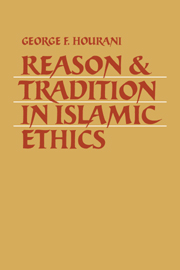Book contents
- Frontmatter
- Contents
- Preface
- Foreword by Michael Marmura
- Conventions
- Titles and locations of the original articles
- Introduction
- 1 Islamic theology and Muslim philosophy
- 2 Ethics in classical Islam: a conspectus
- 3 Ethical presuppositions of the Qurʾān
- 4 ‘Injuring oneself’ in the Qurʾān, in the light of Aristotle
- 5 Two theories of value in early Islam
- 6 Islamic and non-Islamic origin of Muʿtazilite ethical rationalism
- 7 The rationalist ethics of ʿAbd al-Jabbār
- 8 Deliberation in Aristotle and ʿAbd al-Jabbār
- 9 Ashʿarī
- 10 Juwaynī's criticisms of Muʿtazilite ethics
- 11 Ghazālī on the ethics of action
- 12 Reason and revelation in Ibn Ḥazm's ethical thought
- 13 The basis of authority of consensus in Sunnite Islam
- 14 Ibn Sīnā's ‘Essay on the secret of destiny’
- 15 Averroes on good and evil
- 16 Combinations of reason and tradition in Islamic ethics
- Select bibliography
- Index
16 - Combinations of reason and tradition in Islamic ethics
Published online by Cambridge University Press: 13 October 2009
- Frontmatter
- Contents
- Preface
- Foreword by Michael Marmura
- Conventions
- Titles and locations of the original articles
- Introduction
- 1 Islamic theology and Muslim philosophy
- 2 Ethics in classical Islam: a conspectus
- 3 Ethical presuppositions of the Qurʾān
- 4 ‘Injuring oneself’ in the Qurʾān, in the light of Aristotle
- 5 Two theories of value in early Islam
- 6 Islamic and non-Islamic origin of Muʿtazilite ethical rationalism
- 7 The rationalist ethics of ʿAbd al-Jabbār
- 8 Deliberation in Aristotle and ʿAbd al-Jabbār
- 9 Ashʿarī
- 10 Juwaynī's criticisms of Muʿtazilite ethics
- 11 Ghazālī on the ethics of action
- 12 Reason and revelation in Ibn Ḥazm's ethical thought
- 13 The basis of authority of consensus in Sunnite Islam
- 14 Ibn Sīnā's ‘Essay on the secret of destiny’
- 15 Averroes on good and evil
- 16 Combinations of reason and tradition in Islamic ethics
- Select bibliography
- Index
Summary
Standards of conduct and character in any society are derived from several sources: from religious prescription, custom, model individuals such as prophets, parents and friends; from literature; finally from the value decisions of everyone in judging his own behaviour and that of others in the past and present, and in prescribing for himself and others in the future. Amid this variety, no accurate answer can be given to the question: to what extent were the ideals of classical Islamic society derived from specifically Islamic sources – the Qurʾān and Traditions as interpreted by Muslim scholars? But at least it is certain that these sources were of predominant importance in all Muslim countries until the nineteenth century and still prevail in the more conservative countries and in all rural areas. This was and is inevitable wherever the basic education of children is the study of the Qurʾān, with its well defined ethical precepts and attitudes to life on earth.
So it will be worth our while to review briefly the norms emphasized by the scripture of Islam, as a prelude to the main topic of this paper, which will be the methods by which norms have been thought to be properly learned by the Muslim community; in other words the methods of ethics according to Muslim thinkers.
- Type
- Chapter
- Information
- Reason and Tradition in Islamic Ethics , pp. 270 - 276Publisher: Cambridge University PressPrint publication year: 1985
- 1
- Cited by

